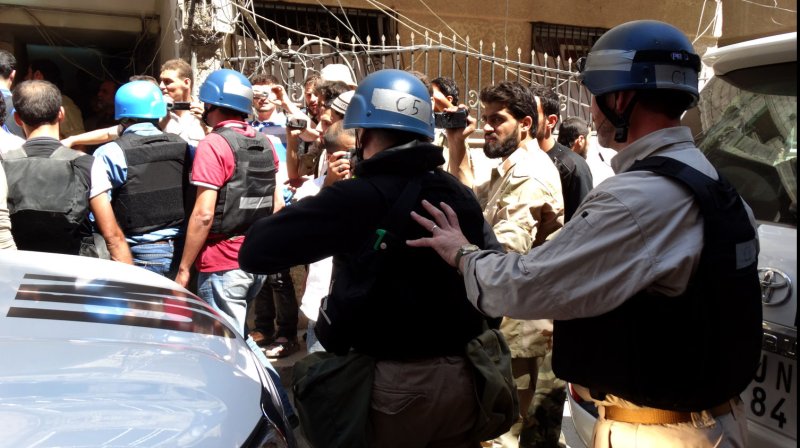1 of 6 | Opposition fighters and civilians stand near members of a United Nations (UN) delegation as UN arms experts inspect the site where rockets fell in Damascus' Eastern Ghouta suburb on August 28, 2013. Rebels who control the area said the inspectors travelled in a six-vehicle convoy to investigate a suspected chemical weapons strike on August 21. UPI/Mohammed Al-Abdullah |
License Photo
LONDON, Aug. 29 (UPI) -- The British House of Commons voted Thursday not to take military action against Syria for the regime's alleged use of chemical weapons against rebels.
Lawmakers voted 285-272 against taking action and Prime Minister David Cameron said he would "act accordingly," the BBC reported.
Syrian lawmakers had sent a letter to their British counterparts warning military action could lead to "sectarian mass murder."
The vote came as The New York Times reported U.S. President Barack Obama is willing to go it alone in taking action to punish the regime of President Bashar Assad.
French Defense Minister Jean-Yves Le Drian said earlier France is capable of joining air attacks on Syria if President Francois Hollande orders the action, Radio France Internationale reported.
U.N. Secretary-General Ban Ki-moon said the inspection team in Syria is expected finish its work Friday.
The team has been investigating what rebels say was a chemical attack last week by forces loyal to Assad.
The Syrian letter, addressed to John Bercow, speaker of the House of Commons, compared the situation to the invasion of Iraq in 2003 and the 1914 assassination of Archduke Franz Ferdinand of Austria, which led to the outbreak of World War I, the Times reported. The Iraq invasion followed false claims that Saddam Hussein possessed weapons of mass destruction, while World War I was a result of "breakdowns in communication," the letter said.
Bercow confirmed receiving the letter, signed by his Syrian counterpart, Jihad Allaham, and a spokeswoman said it is available to members of Parliament in the library.
The Times said it obtained a copy from a Syrian businessman.
In the letter, the Syrians suggested international airstrikes would "plunge secular Syria, and indeed the whole region, into a cataclysm of sectarian mass murder." The lawmakers depicted Syria as linked to the west by opposition to terrorism and religious extremism without mentioning the lack of democracy in the country.
Ban, in Vienna to attend a peace forum, told reporters the U.N. inspectors will report to him as soon as they leave Syria.
He said he spoke with Obama Wednesday, discussing how the United Nations and countries would work together and how inspectors could expedite their investigation.
"I have also expressed my wish that this investigation team should be allowed to continue their work as mandated by the member states and I told him that we will surely share the information and the analysis of samples and evidence with Members of the Security Council and U.N. members in general," Ban said.
Syria wrote to Ban, asking that the U.N. weapons team be allowed to stay longer to investigate alleged rebel use of chemical weapons in three attacks on regime forces this month.
Britain deployed fighter jets to Cyprus in case Assad retaliates for any airstrikes, The Daily Telegraph reported Thursday.
Royal Air Force sources told the Telegraph the Typhoon fighters would be stationed at Akrotiri air base to act as a "defensive shield" if a "rogue aircraft" attacks the base.
Also Wednesday, the Russian navy said a plan to beef up its Mediterranean flotilla with ships from its Northern fleet was a "routine rotation," not linked to the Syria crisis.
The Telegraph said a senior member of the Russian General Staff was quoted as saying at least two vessels would be redeployed from the Arctic and the Atlantic to "adjust" Russia's naval presence in the eastern Mediterranean.
Deputy Prime Minister Nick Clegg, noting he was "wrestling" with deciding whether to support military action, told the BBC evidence indicated Syrian opposition forces were incapable of carrying out the chemical attack last week in suburbs of Damascus in which hundreds, possibly more than 1,000, died.
In the United States, a bipartisan group of House members -- 98 Republicans and 18 Democrats -- signed a letter demanding Obama seek congressional authorization before a military strike.
Obama told the "PBS NewsHour" Wednesday he hadn't decided whether to order a military attack, but said if he does, it would be limited.
"I have no interest in any kind of open-ended conflict in Syria," Obama said, but "there need to be international consequences" for the chemical strikes.
A closed-door meeting of the five permanent U.N. Security Council members Wednesday ended without considering a British resolution allowing the use of force to prevent further chemical-weapons use in Syria because Russia opposed the measure. The Security Council was meeting again Thursday.
Russia said the measure was premature and the council should wait until U.N. chemical-weapons inspectors deliver their final report, diplomatic officials and Russia's Interfax news agency said.
The U.S. State Department responded saying protracted Security Council discussions were immaterial to Obama's decision.
"We see no avenue forward [at the United Nations], given continued Russian opposition to any meaningful council action on Syria," department spokeswoman Marie Harf told reporters. "Therefore, the United States will continue its consultations and will take appropriate actions to respond in the days ahead."















